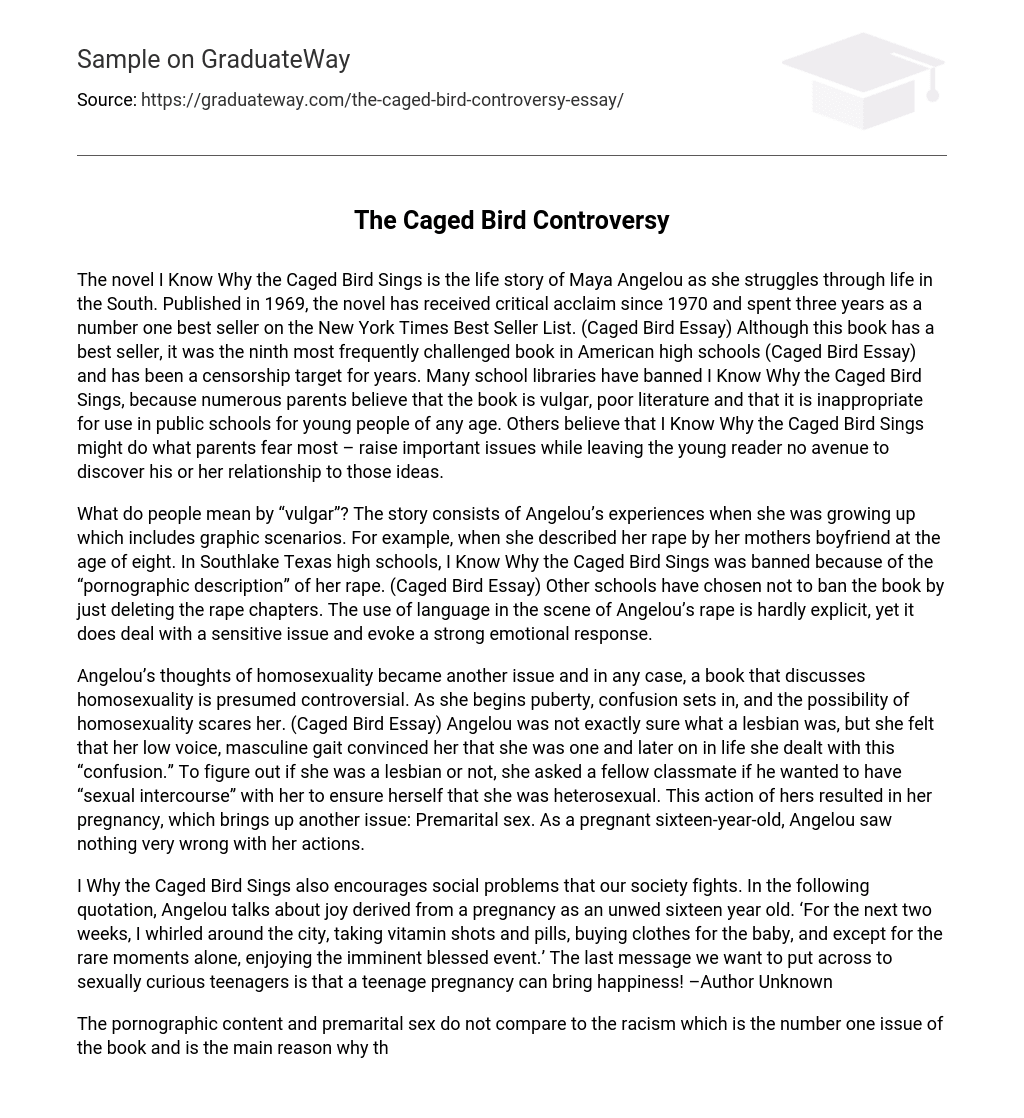Maya Angelou’s I Know Why the Caged Bird Sings portrays her struggles in the Southern United States. Published in 1969, it has been highly regarded since 1970 and spent three years as a best-seller on the New York Times Best Seller List (Caged Bird Essay). Despite its popularity, the book has faced censorship and challenges, particularly in American high schools. It ranked ninth among frequently challenged books, with some parents finding it vulgar and unsuitable for young readers (Caged Bird Essay). Nonetheless, there are supporters who argue that banning this novel denies young readers the opportunity to engage with important issues and develop their own perspectives.
What is the definition of “vulgar”? The story recounts Angelou’s childhood experiences, which involve graphic situations. For instance, she recounts the rape perpetrated by her mother’s boyfriend when she was eight years old. The book I Know Why the Caged Bird Sings was prohibited in Southlake Texas high schools due to the “pornographic description” of this rape. Some other schools have opted to keep the book but remove the chapters that detail the rape. Although the language used in the rape scene is not excessively explicit, it does address a sensitive matter and elicits a powerful emotional reaction.
Controversy surrounded Angelou’s views on homosexuality, particularly during her adolescence when she experienced confusion and fear regarding her own sexual orientation. Uncertain about the meaning of being a lesbian, she questioned her identity due to her deep voice and masculine behavior. This uncertainty persisted into adulthood, leading her to approach a classmate with the intention of engaging in “sexual intercourse” in order to explore and confirm her heterosexuality. Unfortunately, this decision resulted in an unintended pregnancy at the age of sixteen, opening up another controversial topic: premarital sex. Despite her youth and the circumstances surrounding her pregnancy, Angelou did not perceive any significant wrongdoing in what she had done.
I Know Why the Caged Bird Sings also addresses social issues that our society struggles with. In the following quote, Angelou discusses the joy she experienced during her pregnancy at the age of sixteen, despite being unmarried. ‘For the next two weeks, I hurriedly went around the city, receiving vitamin shots and pills, purchasing baby clothes, and, except for a few rare moments alone, delighting in the upcoming blessed event.’ The implication we do not want to convey to sexually curious teenagers is that a teenage pregnancy can lead to happiness! -Author Unknown
The primary cause for the controversy surrounding this book is its depiction of racism, which takes precedence over any other issues such as explicit content and premarital sex. The novel’s powerful portrayal of race relations undeniably highlights the significance of this theme, leading to the considerable attention it has received.
Set in the South, where racial tension was historically at its worst, the novel explores the controversy surrounding its subject matter. Through the experiences of a young Angelou, the book delves into the evident and subtle impact of racism. As a child, Angelou grappled with mixed emotions when confronted with oppression. The derogatory remarks made by white individuals, such as a doctor who stated, “My policy is that I’d rather stick my hand down a dog’s mouth than a nigger’s,” filled her with horror. These comments fueled her anger towards her community. Angelou often pondered what it would be like to wake up in a white world, possessing blonde hair and blue eyes. She shuddered at the thought, considering it a nightmare solely because of her race.
Angelou depicts the negative choices made by white America, including the choice to oppress certain groups of people, the choice of lynch law instead of justice, and the choice of intimidation over honor. She also discusses the potential for positive choices: the choice of life over death, the choice of courage over safety, the choice of discipline over chaos, the choice of voice over silence, and the choice of compassion over pity, hatred, and habit. Additionally, she emphasizes the importance of choosing work, planning, and hope instead of useless recrimination and slovenly despair. – Opal Moore: Learning to Live: When the Bird Breaks from the Cage
The novel implicitly criticizes the depiction of hatred between the races, which may be uncomfortable for southern whites. Marjorie Jones, head of the American Civil Liberties Union Arts Censorship project, expressed her thoughts on this matter.
“(Angelou) illustrates white people in a negative light, as horrible, nasty, and unintelligent individuals…and I do not appreciate being depicted in such a manner.” –Marjorie Heins, The Washington Post 1/11/98
However, supporters of the book argue:
“Angelou utilizes her poetic talents to provide students with a vivid depiction of life during segregation. She presents a firsthand narrative of a grim chapter in history, possessing the same sense of urgency as Anne Frank’s account.” – Annie Gowen, The Washington Post 1/11/98
Overall, there is a widespread belief that “I Know Why the Caged Bird Sings” is one of Angelou’s most exceptional literary works to date. However, this book will continue to provoke controversy for an extended period. Perchance, in the future, parents will grasp the significance of the crucial themes and emotions depicted in the narrative and empathize with them from Maya Angelou’s perspective.





